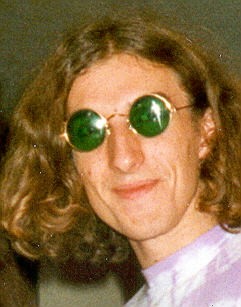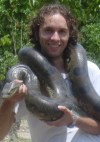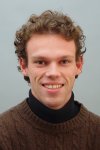| General |
| Home page |
| Principles |
| Gallery |
| Documentation |
| Publications |
| Downloads |
| Mailing lists |
| People |
| Development |
| Project page |
| CVS access |
| Bug reports |
| Feature requests |
| Exits |
| Photonics@INTEC |
| Python |
 Peter Bienstman developed CAMFR during his PhD thesis. He was born in Ghent, Belgium, in 1974. He received a degree in electrical engineering from Ghent University, Belgium, in 1997 and a Ph.D. from the same university in 2001, at the Department of Information Technology
(INTEC), where he is currently an assistant professor. During 2001-2002, he spent a year in the Joannopoulos research group at MIT.
Peter Bienstman developed CAMFR during his PhD thesis. He was born in Ghent, Belgium, in 1974. He received a degree in electrical engineering from Ghent University, Belgium, in 1997 and a Ph.D. from the same university in 2001, at the Department of Information Technology
(INTEC), where he is currently an assistant professor. During 2001-2002, he spent a year in the Joannopoulos research group at MIT.
His research interests include the modeling of optical structures, notably photonic crystal structures, vertical-cavity surface-emitting lasers and resonant-cavity light-emitting diodes. |
 Lieven Vanholme was born in 1977, studied physics at Ghent University where
he got a supplementary degree in informatics. His Michael Jackson imitation of John Lennon is quite amazing. We asked him what he thought about CAMFR:
Lieven Vanholme was born in 1977, studied physics at Ghent University where
he got a supplementary degree in informatics. His Michael Jackson imitation of John Lennon is quite amazing. We asked him what he thought about CAMFR:
Lieven: "CAMFR is really super cool man! People don't have to make samples no more, all waveguides can be simulated, it's great. I'm writing a soundtrack for CAMFR 3D. We really need to heal the world. Just imagine, we all live in cyber space, it would be woow!" |
 Mihai Ibanescu was born in 1977 in Romania. In 2000,
he started a PhD in the Joannopoulos research group
at MIT. He got acquainted with Python
while playing with CAMFR, and then deepened his knowledge while on a
trip to the Peruvian jungle. His research is in the area of photonic
crystals, with a focus on omniguide fibers.
Mihai Ibanescu was born in 1977 in Romania. In 2000,
he started a PhD in the Joannopoulos research group
at MIT. He got acquainted with Python
while playing with CAMFR, and then deepened his knowledge while on a
trip to the Peruvian jungle. His research is in the area of photonic
crystals, with a focus on omniguide fibers.
|
 Pieter Dumon was born at the Flemish/Belgian seaside in 1979 and studied
electrical engineering at Ghent University. Since 2002, he is working
towards a PhD on tiny WDM filters in Silicon-on-Insulator at the
photonics research group at INTEC. Recently, he wrote some bits of CAMFR
code. Started as a succesful attempt to break the stable code, these
evolved into actually useful functionality, most notably that of Bloch input and output waveguides. You can find more info on Pieter here.
Pieter Dumon was born at the Flemish/Belgian seaside in 1979 and studied
electrical engineering at Ghent University. Since 2002, he is working
towards a PhD on tiny WDM filters in Silicon-on-Insulator at the
photonics research group at INTEC. Recently, he wrote some bits of CAMFR
code. Started as a succesful attempt to break the stable code, these
evolved into actually useful functionality, most notably that of Bloch input and output waveguides. You can find more info on Pieter here.
|
 Roel Baets is the head of the photonics group
of the Department of Information Technology at the
Ghent University in Belgium. He received the degree in electrical engineering from Ghent University, Belgium, in 1980. He received the M.Sc. degree in electrical engineering from Stanford University in 1981 and the Ph.D. degree from Ghent University in 1984. Since 1981 he has been with the Department of Information Technology (INTEC) of the Ghent University, where he is a professor since 1989. Roel Baets has worked in the field of III-V devices for optoelectronic systems. With about 200 publications and conference papers he has made contributions to the design and fabrication of semiconductor laser diodes, passive guided wave devices, PICs and microoptic components. Roel Baets is a member of the Optical Society of America, IEEE-LEOS, SPIE and the Flemish Engineers Association.
Roel Baets is the head of the photonics group
of the Department of Information Technology at the
Ghent University in Belgium. He received the degree in electrical engineering from Ghent University, Belgium, in 1980. He received the M.Sc. degree in electrical engineering from Stanford University in 1981 and the Ph.D. degree from Ghent University in 1984. Since 1981 he has been with the Department of Information Technology (INTEC) of the Ghent University, where he is a professor since 1989. Roel Baets has worked in the field of III-V devices for optoelectronic systems. With about 200 publications and conference papers he has made contributions to the design and fabrication of semiconductor laser diodes, passive guided wave devices, PICs and microoptic components. Roel Baets is a member of the Optical Society of America, IEEE-LEOS, SPIE and the Flemish Engineers Association.
|